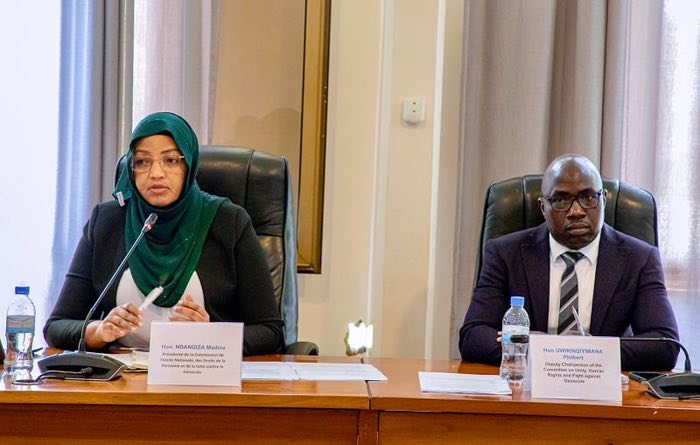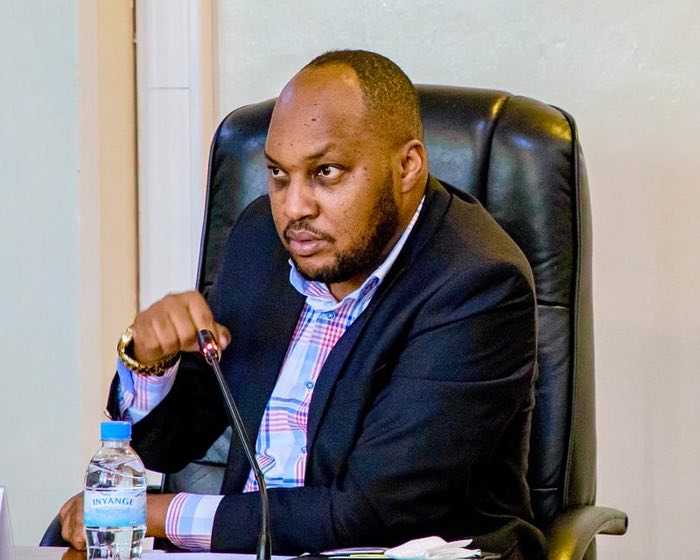
Members of the parliamentary committee on national unity and reconciliation meeting with Never Again Rwanda
Dr. Joseph Ryarasa Nkurunziza, the Executive Director of Never Again Rwanda, on Monday urged lawmakers to introduce civic education in primary schools as part of the country’s broader efforts to eliminate genocide ideology among youth.
Speaking before the parliamentary committee on national unity and reconciliation, Dr. Ryarasa outlined his organization’s role in supporting the government’s 2020 National Policy on Unity and Reconciliation. He said Never Again Rwanda has been active in healing and reconciliation work since 2015.

Dr. Joseph Ryarasa Nkurunziza, the Executive Director of Never Again Rwanda
“We started with one group of 30 people. Today, we have 490 groups across the country, totaling 10,500 members — 690 men and 9,810 women,” Dr. Ryarasa said. “These groups engage in trauma healing and development activities.”
According to Never Again Rwanda, the groups consist of individuals who have undergone healing and are committed to peaceful coexistence, including both genocide survivors and perpetrators who have confessed and sought forgiveness.
Beyond reconciliation, members participate in cooperative farming, community savings and loan associations, and other economic empowerment initiatives.
A study conducted by the organization on 1,420 individuals revealed that 66% no longer experienced suicidal thoughts. Of the 10,500 monitored members, 50 reportedly recovered from severe depression as a result of trauma counseling.
Despite these gains, Dr. Ryarasa warned that genocide ideology persists, especially among young people influenced by their families.
“In our conversations with children, some said they heard parents describe Tutsis as bad people,” he said. “Others feared classmates based on what they were told at home, sometimes because a relative was imprisoned for genocide.”
He called for early civic education to give children accurate knowledge about Rwanda’s history and identity, helping them critically evaluate messages from their families and the internet.
“If these lessons are taught in school, children will grow up knowing the truth,” he said. “It will help them distinguish facts from inherited misinformation.”
Members of Parliament also raised concerns about the lingering presence of genocide ideology among young Rwandans. Hon. Benoît Senani asked what could be done to engage the youth more effectively in the country’s reconciliation agenda.
Dr. Ryarasa pointed to high unemployment and online misinformation as major risk factors, noting that idle youth spend long hours on social media and video platforms like YouTube, which may expose them to harmful content.
“Youth who are productively engaged are less likely to fall into divisive ideologies,” he said. “The ‘Ndi Umunyarwanda’ campaign should continue and be adapted for youth audiences.”
In February, Never Again Rwanda conducted discussions with youth aged 19 to 23. While many said they embraced national identity, others admitted that unemployment and lack of direction made them vulnerable to extremist content.
Committee chairperson Hon. Madina Ndangiza said the meeting with Never Again Rwanda was part of the committee’s ongoing assessment of national unity efforts. The committee plans to conduct nationwide outreach visits, including meetings with genocide convicts who have completed their sentences, to understand their reintegration experience.
“We will also visit community groups supported by Never Again Rwanda and hear from both perpetrators and survivors on how they coexist,” Ndangiza said. “After these consultations, we plan to engage the Ministry of National Unity and Civic Engagement to discuss the proposed civic education curriculum.”
She added that Parliament’s responsibilities include oversight of government initiatives, public engagement, and developing recommendations that can be submitted to the national plenary.
Despite remaining challenges, Rwanda has made considerable progress. The national unity and reconciliation index currently stands at 94.7%, according to government data. Eighty-three percent of genocide perpetrators have acknowledged their crimes and asked for forgiveness, while 85% of survivors reported living peacefully with them.
Additionally, 99% of Rwandans identify with a unified national identity, and 94.6% say they have a clear understanding of the country’s history.
